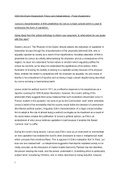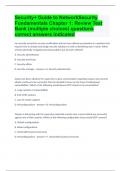AQA Non-Exam Assessment Theory and Independence - Prose Assignment.
‘Leroux’s characterisation of Erik establishes his role as a tragic outcast which is used to
emphasise the harm of capitalism.’
Using ideas from the critical anthology to inform your argument, to what extent do you agree
with this view?
Gaston Leroux’s ‘The Phantom of the Opera’ directly attacks the radicalism of capitalism in
Edwardian Europe through the characterisation of the physically deformed Erik; who is
arguably rejected by society as a result of his imperfections. Societies alienation of Erik is
presented by Leroux as unfairly dehumanising his character, and as a consequence of his
neglect, he does not understand human nature or emotion which arguably justifies the
crimes he commits, as he does not understand the significance of his actions. Erik’s
frustration of knowing his inability to belong to a capitalist society because of his physical
flaws, enables the reader to sympathise with his character as arguably, his only sense of
identity is his embodiment of injustice and as being a tragic outcast despite being described
by Leroux as being a mesmerising talent.
Leroux wrote his political novel in 1911, as a reflective response to his experiences as a
reporter covering the 1905 Russian Revolution, however, the novel’s setting of the
aristocratic Paris suggests that Leroux believed that such revolutions should also occur in
France; evident in the quotation “we were to go by the Communists' road” which embodies
Leroux’s belief of the inevitability that the country would follow the direction of communism
(the Marxist political system.) Arguably, Erik’s characterisation of a tragic outcast enables
him to adapt to the role of almost being a author's surrogate as his treatment as a result of
his social status creates the justification of Leroux’s political opinion, as Erik is an
embodiment of why Leroux believes capitalism is bad because it enables the flawed
‘common man’ to suffer.
During the novel’s rising tension, Leroux uses Erik’s voice as an instrument to commentate
on how capitalism has enabled the novel’s other characters to wear a ‘metaphorical mask’
which conceals their emotional flaws. This is apparent in Erik’s realisation that “in Paris, our
lives are one masked ball” - a metaphorical suggestion that depicts capitalist society is not
visibly accurate, as the discussion of masks implies that every Parisian has two identities,
the person wearing the mask, and the person underneath it. Something which is particularly
evident when considering Christine, who is visibly described as being beautiful, however,
1
‘Leroux’s characterisation of Erik establishes his role as a tragic outcast which is used to
emphasise the harm of capitalism.’
Using ideas from the critical anthology to inform your argument, to what extent do you agree
with this view?
Gaston Leroux’s ‘The Phantom of the Opera’ directly attacks the radicalism of capitalism in
Edwardian Europe through the characterisation of the physically deformed Erik; who is
arguably rejected by society as a result of his imperfections. Societies alienation of Erik is
presented by Leroux as unfairly dehumanising his character, and as a consequence of his
neglect, he does not understand human nature or emotion which arguably justifies the
crimes he commits, as he does not understand the significance of his actions. Erik’s
frustration of knowing his inability to belong to a capitalist society because of his physical
flaws, enables the reader to sympathise with his character as arguably, his only sense of
identity is his embodiment of injustice and as being a tragic outcast despite being described
by Leroux as being a mesmerising talent.
Leroux wrote his political novel in 1911, as a reflective response to his experiences as a
reporter covering the 1905 Russian Revolution, however, the novel’s setting of the
aristocratic Paris suggests that Leroux believed that such revolutions should also occur in
France; evident in the quotation “we were to go by the Communists' road” which embodies
Leroux’s belief of the inevitability that the country would follow the direction of communism
(the Marxist political system.) Arguably, Erik’s characterisation of a tragic outcast enables
him to adapt to the role of almost being a author's surrogate as his treatment as a result of
his social status creates the justification of Leroux’s political opinion, as Erik is an
embodiment of why Leroux believes capitalism is bad because it enables the flawed
‘common man’ to suffer.
During the novel’s rising tension, Leroux uses Erik’s voice as an instrument to commentate
on how capitalism has enabled the novel’s other characters to wear a ‘metaphorical mask’
which conceals their emotional flaws. This is apparent in Erik’s realisation that “in Paris, our
lives are one masked ball” - a metaphorical suggestion that depicts capitalist society is not
visibly accurate, as the discussion of masks implies that every Parisian has two identities,
the person wearing the mask, and the person underneath it. Something which is particularly
evident when considering Christine, who is visibly described as being beautiful, however,
1



